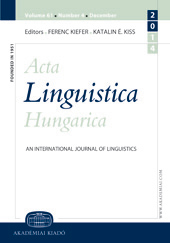The mental lexicon: Results of some word association experiments
The mental lexicon: Results of some word association experiments
Author(s): Mária Gósy, Magdolna KovácsSubject(s): Phonetics / Phonology, Psycholinguistics, Cognitive linguistics
Published by: Akadémiai Kiadó
Summary/Abstract: There are numerous hypotheses concerning the structure, size, and strategies of adults’ mental lexicon. This is the first time, however, that children’s mental vocabularies are analysed using the technique of free word associations (with the participation of two hundred 12-year-old and two hundred 13-year-old pupils). The analysis focuses on both quantitative and qualitative characteristics of the data like types of associations, lexical representations, distribution of word categories or semantic analysis of words. Comparisons are also made with a very similar material found in the Hungarian literature that provides a unique opportunity to look at the differences of the mental lexicon after 60 years. The discussion concerns (i) the patterns of the tested children’s mental lexicon (including the individual performances) and (ii) vocabulary changes seen as a multifactorial consequence of the progress of time. The hypothesis about the speed of lexical access being a definitive factor in the development of the mental lexicon has been confirmed and may be applied to other languages as well.
Journal: Acta Linguistica Hungarica (Since 2017 Acta Linguistica Academica)
- Issue Year: 49/2002
- Issue No: 2
- Page Range: 179-224
- Page Count: 46
- Language: English

